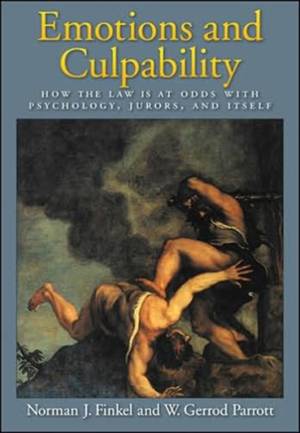
- Afhalen na 1 uur in een winkel met voorraad
- Gratis thuislevering in België vanaf € 30
- Ruim aanbod met 7 miljoen producten
- Afhalen na 1 uur in een winkel met voorraad
- Gratis thuislevering in België vanaf € 30
- Ruim aanbod met 7 miljoen producten
Zoeken
Emotions and Culpability
How the Law Is at Odds with Psychology, Jurors, and Itself
Norman J Finkel, W Gerrod Parrott
€ 35,45
+ 70 punten
Omschrijving
The authors argue persuasively that U.S. law is out of touch with the way that jurors? ?commonsense justice? works and the way they judge culpability. This disconnect has resulted in some inconsistent verdicts across different types of cases and thus has serious implications for whether the law will be respected and obeyed. Problems arise because criminal law has no unified theory of emotion and culpability, and legal scholars often seem to misunderstand or ignore what psychologists know about emotion. The authors skillfully show that the law's culpability theories are (and must be) psychological at heart, and they propose ways in which psychology can help inform and support the law.
Specificaties
Betrokkenen
- Auteur(s):
- Uitgeverij:
Inhoud
- Aantal bladzijden:
- 312
- Taal:
- Engels
- Reeks:
Eigenschappen
- Productcode (EAN):
- 9781591474166
- Verschijningsdatum:
- 15/06/2006
- Uitvoering:
- Hardcover
- Formaat:
- Genaaid
- Afmetingen:
- 185 mm x 262 mm
- Gewicht:
- 807 g

Alleen bij Standaard Boekhandel
+ 70 punten op je klantenkaart van Standaard Boekhandel
Beoordelingen
We publiceren alleen reviews die voldoen aan de voorwaarden voor reviews. Bekijk onze voorwaarden voor reviews.







